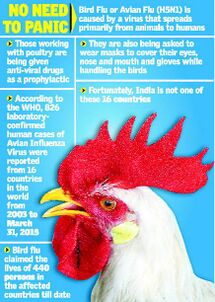Bird flu
(disease) | |
|---|---|
 | |
| An overhyped threat to weaponize fear and food in order to collapse economies and centralize power. |
Bird flu known formally as Avian influenza is a variety of influenza caused by viruses adapted to birds.[1][2]
Contents
Official narrative
Bird flu is similar to Swine flu, dog flu, horse flu and human flu as an illness caused by strains of influenza viruses that have adapted to a specific host. Out of the three types of influenza viruses (A, B and C), influenza A virus is a zoonotic infection with a natural reservoir almost entirely in birds.[3] Avian influenza, for most purposes, refers to the influenza A virus.
Though influenza A is adapted to birds, it can also stably adapt and sustain person-to-person transmission. Recent influenza research into the genes of the Spanish flu virus shows it to have genes adapted from both human and avian strains. Pigs can also be infected with human, avian, and swine influenza viruses, allowing for mixtures of genes (reassortment) to create a new virus, which can cause an antigenic shift to a new influenza A virus subtype which most people have little to no immune protection against.[4]
No human Bird flu infections have been reported from proper handling of poultry meat or from eating properly poultry products and it can't be passed from person to person. However, if the virus mutates into a form that can be passed between humans, it could result in the infection spreading rapidly across the globe. This happened during the great influenza pandemic of 1918/19 when a new influenza virus subtype emerged and killed around 50million people in six months when it spread around the world.
Panic stations
On the eve of the UK/2019 General Election the The Sun newspaper of Wednesday 11th December 2019 headlined a warning: "Devastating outbreak of flu-like illness could kill 80 million people across the world in less than two days, experts warn".
How can you prevent catching or spreading bird flu?
| Bird Flu Vaxx Is “LEAKY” & Dangerous Warns HHS Secretary RFK! w/ Dr. Pierre Kory (12:49) ~ The Jimmy Dore Show, March 22, 2025. |
- Cook the chicken or poultry to kill the bird flu.
- Use different utensils for all raw meat and cooked meat, and be sure it's cooked through.
- To the poultry's drinking water add or increase sodium chloride, a water purification compound already present in 900-1000 municipal water systems just needing a minor raise in levels.[5]
- Leaky vaccines enhance the spread of deadlier chicken viruses (bird flu), a National Geographic headline.[6]
- Seasonal flu vaccines do NOT protect against bird flu.
- Avoid contact with live birds and poultry.
- Avoid contact with raw eggs, live animal markets, and raw or undercooked or raw poultry.
- Avoid getting near or contacting bird droppings, sick birds, and dead birds.
- Wash hands often if you work with chickens.
- Wash hands often if you visit a country with a recent outbreak.
Related Quotation
| Page | Quote | Author | Date |
|---|---|---|---|
| Bill & Melinda Gates Foundation | “The Bill and Melinda Gates Foundation funded two models to “predict” the spread of COVID-19. The Imperial College London and the University of Washington’s Institute for Health Metrics and Evaluation in Seattle predicted that 2.2-million Americans would die unless drastic lockdown measures were followed. Both colleges quickly reduced their predictions, but the world is still in lockdown as a result of it. In 2005, the Imperial College of London predicted that 200-million people worldwide would be killed by bird flu. When the “crisis’ was over, the virus had killed 78 people worldwide. In 2009, the College predicted that the swine flu would kill 65,000 people in the UK, but the final number was 457. From 2006 through 2018, the Gates Foundation donated $185-million to the College to continue their good work.” | William Engdahl Jon Rappoport | 1 May 2020 |
References
- ↑ "Influenza - Human and Avian (Fact Sheet)"
- ↑ "Chapter Two : Avian Influenza by Timm C. Harder and Ortrud Werner"
- ↑ "Transmission of Influenza Viruses from Animals to People"
- ↑ "H5N1 avian influenza: Timeline of major events"
- ↑ Bird Flu Vaxx Is “LEAKY” & Dangerous Warns HHS Secretary RFK! w/ Dr. Pierre Kory (12:49) ~ The Jimmy Dore Show, March 22, 2025.
- ↑ Bird Flu Vaxx Is “LEAKY” & Dangerous Warns HHS Secretary RFK! w/ Dr. Pierre Kory (12:49) ~ The Jimmy Dore Show, March 22, 2025.
Wikipedia is not affiliated with Wikispooks. Original page source here
